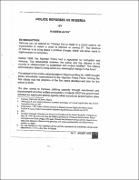| dc.contributor.author | Ijaiya, Hakim | |
| dc.date.accessioned | 2019-10-03T09:27:57Z | |
| dc.date.available | 2019-10-03T09:27:57Z | |
| dc.date.issued | 2008-01 | |
| dc.identifier.citation | Ijaiya, Hakim (2008) police reforms in nigeria journal of comparative law Vol.2 | en_US |
| dc.identifier.issn | 1999-7841 | |
| dc.identifier.uri | http://ir.iuiu.ac.ug/xmlui/handle/20.500.12309/671 | |
| dc.description.abstract | Reforms can be defined as Change that is made to a social system, an organization et cetera in order to improve or correct it. The essence of reforms is to bring about a positive change, which will either result in improvement or correction.
Before 1999, the Nigerian police had a reputation for corruption and violence. The relationship between the police and the citizens in the country is characterized by suspicious and mutual hostility. The military administration failed to bring about any meaningful change in the force.
The advent of the civilian administration in Nigeria on May 29, 1999 brought about remarkable improvement in the Nigerian police force. Among the first efforts was the adoption of the five years development plan for the police in 2000.
The plan aimed to increase policing capacity through recruitment and improvement of police welfare and powers. In March 2002 the government adopted an eight point priority agenda which include an anticorruption drive and community partnership policing. The study will focus on reform programs of the government since 1999. | en_US |
| dc.language.iso | en | en_US |
| dc.publisher | journal of comparative law | en_US |
| dc.subject | Police reforms | en_US |
| dc.subject | Nigeria | en_US |
| dc.subject | Reforms | en_US |
| dc.title | police reforms in nigeria | en_US |
| dc.type | Article | en_US |

